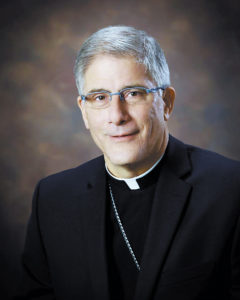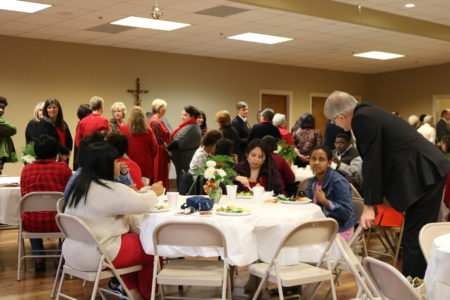
Father Ron Rolheiser
IN EXILE
By Father Ron Rolheiser, OMI
Every year Time magazine recognizes someone as “Person of the Year.” The recognition isn’t necessarily an honor; it’s given to the person whom Time judges to have been the newsmaker of the year – for good or for bad. This year, instead of choosing an individual to recognize as newsmaker of the year, it recognized a category of persons, the Silence Breakers, namely, women who have spoken out about having experienced sexual harassment and sexual violence.
Part of the challenge of Christmas is to recognize where Christ is being born in our world today, where two thousand years after the birth of Jesus we can again visit the stable in Bethlehem, see the new-born child, and have our hearts moved by the power of divine innocence and powerlessness.
For Christmas this year, I suggest we honor refugee children as the “Christ-Child of the Year.” They bring as close to the original crib in Bethlehem as we can get within our world today because for them, as for Jesus two thousand years ago, there is no room at the inn.
Jesus’ birth, like his death, comes wrapped in paradox: He came as God’s answer to our deepest desire, badly wanted, and yet, both in birth and in death, the outsider. Notice that Jesus is born outside the city and he dies outside the city. That’s no accident. He wasn’t born a “wanted” child and he wasn’t an accepted child. Granted, his mother, Mary, and those with genuine religious hearts wanted him, but the world didn’t, at least not on the terms on which he came, as a powerless child. Had he come as a superstar, powerful, a figure so dominant that knees would automatically bend in his presence, a messiah tailored to our imagination, every inn door would have opened to him, not just at birth but throughout his whole life.
But Christ wasn’t the messiah of our expectations. He came as an infant, powerless, hidden in anonymity, without status, invited, unwanted. And so Thomas Merton describes his birth this way: Into this world, this demented inn, in which there is absolutely no room for Him at all, Christ has come uninvited. But because He cannot be at home in it, because He is out of place in it, and yet He must be in it, His place is with those others for whom there is no room.
There was no room for him at the inn! Biblical scholars tell us that our homilies and imaginings about the heartlessness of the innkeepers who turned Mary and Joseph away on Christmas Eve miss the point of that narrative. The point that the Gospels want to make here is not that the innkeepers in Bethlehem were cruel and calloused and this singular, poor, peasant couple, Joseph and Mary, were treated unfairly. The motif of “no room at the inn” wants rather to make a much larger point, the one Thomas Merton just highlighted, namely, that there’s never room in our world for the real Christ, the one who doesn’t fit comfortably into our expectations and imaginings. The real Christ generally shocks our imagination, is a disappointment to our expectations, comes uninvited, is perennially here, but is forever on the outside, on the periphery, excluded by our imaginations and sent packing from our doors. The real Christ is forever seeking a home in a world within which there’s no room for him.
So who best fits that description best today? I suggest the following: Millions of refugee children. The Christ-Child can be seen most clearly today in the countless refugee children who, with their families, are being driven from their homes by violence, war, starvation, ethnic cleansing, poverty, tribalism, racism and religious persecution. They, and their families, best fit the picture of Joseph and Mary, searching for a room, outsiders, powerless, uninvited, no home, no one to take them in, on the periphery, strangers, labeled as “aliens.” But they are the present-day Holy Family and their children are the Christ-Child for us and our world.
Where is the crib of Bethlehem today? Where might we find the infant Christ to worship? In many places, admittedly in every delivery room and nursery in the world, but “preferentially” in refugee camps; in boats making perilous journeys across the Mediterranean; in migrants trekking endless miles in hunger, thirst and dangerous conditions; in people waiting in endless lines to be processed in hope of being accepted somewhere, in persons arriving at various borders after a long journey only to be sent back; in mothers in detention centers, holding their young and hoping; and most especially, preferentially, in the faces of countless refugee children.
The face of God at Christmas is seen more in the helplessness of children than in all the earthly and charismatic power in our world. And so today, if we want, like the shepherds and wise men, to find our way to the crib in Bethlehem we need to look at where, in this demented inn, the most helpless of the children dwell.
(Oblate Father Ron Rolheiser, theologian, teacher and award-winning author, is President of the Oblate School of Theology in San Antonio, TX.)



